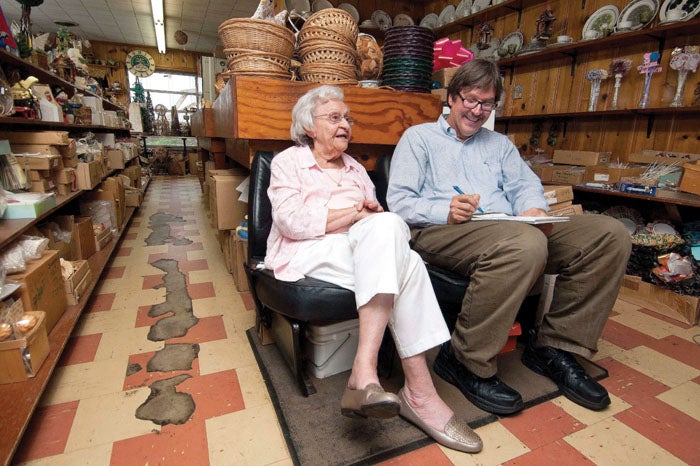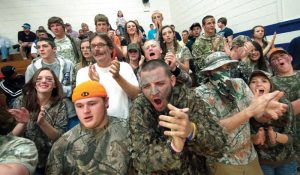Elizabeth Cook: Wineka ready to set out on a new path
Published 12:10 am Wednesday, December 11, 2019

- JON C. LAKEY / SALISBURY POST Mark Wineka interviews Rachel Raper at the family business in Spencer in 2013. The store had recently reached the milestone of 75 years in business.
By Elizabeth Cook
For the Salisbury Post
He came to town a stranger — a quiet, lanky 20-something from Pennsylvania who followed his college girlfriend to the South.
Patiently, he corrected people who struggled to pronounce his name. Not Win-et-ka or Wine-ka.
Win-e-ka.
He cared more about getting their names right, anyway.
Nearly 40 years later, longtime Post reporter Mark Wineka has shared stories from thousands of people and befriended many more. In his quiet, low-key way, he has become the writer people think of in Rowan County when they want an important story told with thoroughness and sensitivity.
As he heads into retirement at the end of the year, Wineka leaves both a voluminous body of work and a daunting void. He’ll continue as editor of Salisbury the Magazine, but he’s stepping away from daily reporting responsibilities.
No more town board meetings and Christmas parades. No more weekend shifts reporting on festivals, fires and fatalities.
“The Post has been lucky to have him,” says Editor Josh Bergeron. “… It’s going to be tough to find a reporter with the unique combination of talents that Mark has.”
• • •
The stars aligned to make this the right time to retire, Wineka says. The mortgage is paid off, he has lined up health insurance and the kids are having grandbabies. He turns 63 later this month.
“I’m just so ready,” he says.
He has plenty of stories to tell those grandchildren when they get older.
He has flown to Panama with the N.C. Air National Guard, covered a presidential straw poll in Iowa and visited Salisbury’s sister city in England. He hiked through the Rocky Mountains with local Boy Scouts and witnessed Hurricane Katrina’s destruction in Mississippi.
“I’ve ridden on street cleaners, snowplows, acrobatic and vintage airplanes. Black Hawk helicopters and speedboats. I’ve bungee-jumped and walked across Rowan County three times,” Wineka says.
He’s met presidents, senators, governors, members of Congress, CEOs, sports hall of famers, NASCAR drivers and movie stars.
Most important, perhaps, he has told the stories of everyday people close to home, documenting their losses and heartaches, their victories and joys.
“Being a reporter for a small town paper sounds pretty boring until you start thinking about what you’ve done,” he says.

Photo by Jon C. Lakey/ Salisbury Post. Mark Wineka shakes hands with Commissioner of Agriculture Jim Graham as he and longtime friend Charlie Peacock arrive at an event to honor Graham at in Raleigh. 11/15/2000
• • •
What made him want to write for newspapers to begin with?
“The short version I’ve always given people is it wasn’t until high school that I realized I wasn’t going to be a Major League Baseball player,” Wineka says.
He grew up in the small farming community of Dover, Pennsylvania, playing baseball, basketball and tennis, and loving baseball most of all. He was good, but hardly Major League Baseball good.
A guidance counselor asked what else he liked to do. The answer was writing, so the counselor steered him toward newspaper journalism. He became sports editor for the high school paper and wrote bittersweet, Harry Chapin-inspired poems for the school’s literary magazine.
Most of all, he realized there were stories that needed to be told.
His father’s feed and hardware store lost business when workers tore up the pavement in front of it to lay sewer lines. The project dragged on and on, and Wineka watched his father at his desk at night, writing to his congressman for help to protect his livelihood. Help didn’t come. The street eventually reopened, but business never picked back up.
The store his father and grandfather founded was auctioned off to a competitor when Wineka was a high school sophomore.
No newspaper covered the story.
“That made a big impression on me,” he says. “… I felt he was dealt an injustice. It didn’t make me want to be a muckraker or anything, but it had an effect.”
• • •
The Watergate scandal that was uncovered by determined newspaper reporters also influenced his path. President Nixon resigned in August 1974 as Wineka headed to Penn State, part of a Watergate-inspired wave of students that flooded journalism schools. Professors were especially tough, trying to weed out all but the best prospects.
Unsatisfied with a C in his first basic news writing course, Wineka covered a speech by former White House counsel John Dean for extra credit. He got an F on the report because of a dangling modifier, he says — “one of those ‘-ing’ phrases that didn’t really identify what came next.”
The C stood.
The professor told an upset Wineka he might want to think about another career, but better things soon fell into place. He spent a term of that year as an intern in Penn State’s sports information office (“A’s across the board,” Wineka says). The next year he got a job on the sidelines at home football games, manning the on-field telephone to the press box.
A brush with fame came when legendary coach Joe Paterno laid his jacket next to the telephone and said to him, “Watch that coat, will ya?” Wineka will forever remember keeping an eye on that coat. “Thanks,” Paterno said when he picked it up later.
Wineka earned a spot on the staff of the college paper, which also served as the town of State College’s morning paper. He got the business beat, and his first story was on the Chamber of Commerce.
Sports was his gateway drug to journalism, he says. He learned to cover whatever came his way.
• • •
Ever economical, Wineka spent his first two years of college near home at Penn State-York, a branch campus where he could play basketball.
His dad paid for his college textbooks, and Wineka otherwise financed his way through college by painting houses in the summer and taking out a small loan.
Summer nights found him on the baseball field, playing catcher or shortstop for the local American Legion team on Monday, Wednesday and Friday and for the town team on Tuesday, Thursday and Saturday.
As graduation approached in 1978, Wineka began applying for jobs near Stanly County, North Carolina, where his girlfriend’s family had moved. He landed a reporting position at The Daily Independent in Kannapolis.
“I came down on a Greyhound bus because I didn’t have a car,” Wineka says.
He got a rental from Lease-A-Lemon in Charlotte, an old Ford LTD police cruiser.
The next week he used money from his grandfather to make a downpayment on his first new car. He drove the orange Ford Fiesta to town board meetings in China Grove and Landis and county commission meetings in Salisbury.
Meanwhile, he got to know and appreciate the South.
“I wouldn’t say it was cultural shock to come down here,” he says. “It was just different.
“I’d go home and people would ask me, ‘What’s it like down there?’ First thing I’d say was, ‘People are so friendly,’ ” Wineka recalled.
Back in Pennsylvania, people would be wary of anyone who tried to talk to them while waiting in line, according to Wineka.
“Down here if you’re waiting in line … it’s just natural to strike up a conversation,” he says. “It’s almost rude if you don’t.”
He remembers an old-timer he interviewed for the Independent.
“He looked at me and said, ‘Where you from, boy?’ And I told him,” Wineka recalled. “He said, ‘Are you a Yankee or a damned Yankee?’ I told him I guess I’m a damned Yankee, ‘cause I’m planning on staying.”

The West Rowan student section gained an interloper for the big rematch with East Rowan, Salisbury Post columnist Mark Wineka tried to blend in with the students to experience first hand the excitement of being a crazie. Photo by Jon C. Lakey, Salisbury Post.
2/21/2013
• • •
He was at the Kannapolis paper about a year and a half before he followed the editor to the Daily Item in Sumter, S.C. Three months later he went to work for the Salisbury Post, starting in April 1980.
“I always liked the Post,” he says. “You could see the real effort involved, especially on Sundays. I thought the Sunday paper at the Post was just chock-full of stuff. And the photography was so much better.”
His first Post story was about overcooked food called in as a kitchen fire that he and photographer James Barringer rushed out to cover. The short article didn’t even get a byline. But countless stories and bylines followed as he covered Spencer, East Spencer, Cleveland and Rockwell, and then moved to the Salisbury city government beat.
He has covered politics, business, the environment, preservation and every town board in the county except Faith’s. He has been sports editor, associate editor and (his favorite) columnist.
He even won a press award for one of his photos.
• • •
Wineka’s three-year stint as sports editor in the early 1990s may have been a sports fan’s dream come true. He covered the Final Four from near half court in Charlotte one year and was courtside for a double-overtime game in Cameron Indoor Stadium between Duke and Carolina.
Sports involved long hours, though, including double shifts Friday-Sunday to cover everything from local high school sports to the Hornets and Panthers in Charlotte.
The Stanly County girlfriend was history by then. Wineka had met and married Lindsay Alford, a former Tennessean who taught hearing-impaired children in Salisbury. They had two young sons, Sam and Benn, and Wineka was away from home more than any of them liked.
He decided to go back to news reporting.
“I quit to save my marriage and see my kids,” he says.

JON C. LAKEY / SALISBURY POST Mark Wineka taking photos for the Salisbury The Magazine. The 49 Days of Graditude celebration opening ceremony kicked of with an short parade through downtown Spencer that ended at the NC Transportation Museum. A Opening ceremony was held in the Back Shop building with several speakers, music and static display of the refinished original 40 & 8 Box Car. Spencer, North Carolina 2/9/19
• • •
He had expected to be at the Post only a couple of years. Offers came in from bigger papers, and he came close to accepting a job at The Winston-Salem Journal after a daylong interview.
“Then toward the end of the day I started thinking, do I want to do this obscure beat they’re proposing to me?” Wineka said. “The thing I loved about the Post was you could pretty much do what you wanted to do, story-wise. And they encouraged that.” He could do a column or a feature, a sports story or a business story. He could write about something on his beat or off his beat.
“I always worried about being so pigeonholed at those bigger papers.”
So he and his creativity stayed at the Salisbury Post, earning awards year after year from the North Carolina Press Association, the Associated Press and other groups.
He had the latitude to go off the beaten path and see what he could find. That included three treks across the county for his “Walking Across Rowan” series, covering 45 miles on the first west-to-east route.
He made the mistake of wearing wool socks at first and later had to rest his feet atop ice packs while he typed up his report for the next day’s paper.
He charted his path on a map, never knowing who or what he might encounter.
“I like that I did that just because I was meeting these people along the way that were as surprised as I was that I was walking along the road,” he said. “That just shows that everyone has a story, of course, and if they don’t have a story they’re doing something pretty interesting.”
People began to anticipate his arrival and they met him with snacks and cold soft drinks. He ate a lot of tomato sandwiches.
“On one trip I gained two pounds,” he says.
• • •
He was appreciative but embarrassed when Salisbury City Council marked the end of his council coverage by giving him a key to the city in May 2005.
If he’d been doing his job correctly, he says, he’d have had a more antagonistic relationship with city leaders. He’s afraid they looked to him more for public relations than hard news coverage.
But telling human interest stories has been his forte.
“I never thought of myself as a journalist. It was always storytelling to me,” he says. “I loved the variety of stuff here. You could go to a fire in the morning and be talking to a 100-year-old in the afternoon.”
Without being maudlin or sappy, Wineka has shown a knack for putting together words and scenes that leave an impression.
In 2016, he wrote about Don and Margaret Livengood, who died within hours of each other, holding hands in a hospital intensive care unit. Wineka interviewed their daughter, who remembered her parents talking about entering the Pearly Gates. “We could walk in together, just like we’re getting married again,” her father had told her.
Of McLaughlin’s Grocery on Monroe Street, Wineka wrote: “John McLaughlin manned that store like an Army post in the West End for decades to come.”
And he often writes about veterans. This is from 2014: “There’s a reason the mysterious wreath shows up now and then at the memorial to Lance Cpl. Nathan Elrod. It’s a way of saying thanks, knowing we never do it enough.”
• • •
Not every assignment can be heartwarming.
“Probably the toughest story was the fire when the Monroe boy and Vic Isler died,” Wineka says. “That was several weeks of tough stories. First it was the fire itself and the sadness that came with that. Then the funeral. Then you had to do stories about what could have been done to prevent it.”
Justin Monroe had been only 19 when he died in the 2008 fire. Isler left behind a wife and two children.
“Those were tough stories.”
Wineka has often been called on to write what he calls “obituary-type stories” when prominent citizens die to tell the person’s life story.
“Sometimes I think the family feels better afterwards. But it’s tough to do that, and as you do it you think, why didn’t I do that while they were living?”

JON C. LAKEY/SALISBURY POST 5/3/2018 MArk Wineka near his cubicle in the newsroom at the Salisbury Post office.
• • •
Wineka feels as though he grew up in Salisbury, with fellow reporter Rose Post looking over him in her maternal way. For years he and Post sat in a corner of the newsroom he dubbed “Shady Rest” because they were the most senior reporters by several years.
The late Jimmy Hurley, publisher of the Post until 1997, had huge impact on his life, he says. When Wineka asked then-editor Steve Bouser for time off to write a book about Food Lion, Hurley backed him up. Five years from now, Hurley told the editor, you won’t know he was ever gone.
The result in 1991 was “Lion’s Share,” the story of the Salisbury-based grocery chain’s meteoric rise, co-written with Jason Lesley, then a Post editor. They later helped Food Lion co-founder Ralph Ketner write his autobiography, “Five Fast Pennies.”
After Hurley announced in 1997 that his family was selling the paper to Evening Post Publishing of Charleston, South Carolina, Wineka worked with Hurley to write a book on the paper’s history, “A Family Affair.”
• • •
Time changes things. Wineka has gone from driving a zippy Fiesta to a venerable, 1995 Ford F-150 he calls “Old Blue.” The lanky frame filled out, and there’s an increasing amount of gray in his mustache and hair.
By default, Wineka has become the newsroom’s good-natured grump. He occasionally ends conversations with “Don’t bother me” — a form of endearment, he says. A co-worker who’s leaving for another job is likely to get a “You’re dead to me” remark, a jest to soften what is often a bittersweet moment. So many have moved on.
That humor sometimes throws people off.
Reporter Liz Moomey remembers interviewing for her job at the Post. She was meeting with a few reporters when Wineka popped in. “Don’t do it!” he told her.
“You can’t imagine how I felt in that moment,” Moomey says.
She took the job anyway and learned to appreciate Wineka’s wealth of knowledge about the community — better than Google, she says.
And better than he ever knew his hometown. This is home now, where he’s told the life stories of so many and built his own. Once more he’s charted a course — retirement — where he’s not sure what he’ll find. As he says, everyone has a story. Wineka is eager to see what’s around the next bend.




